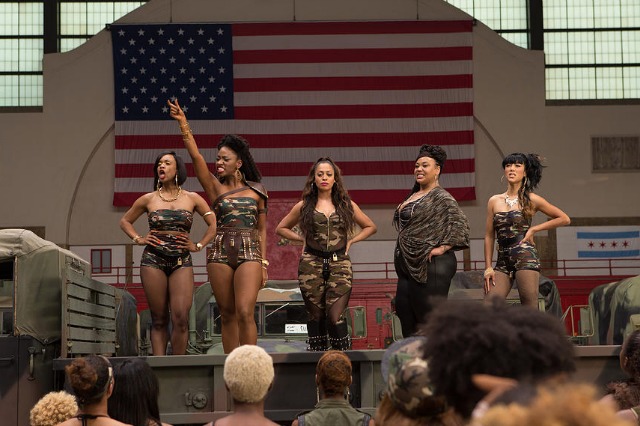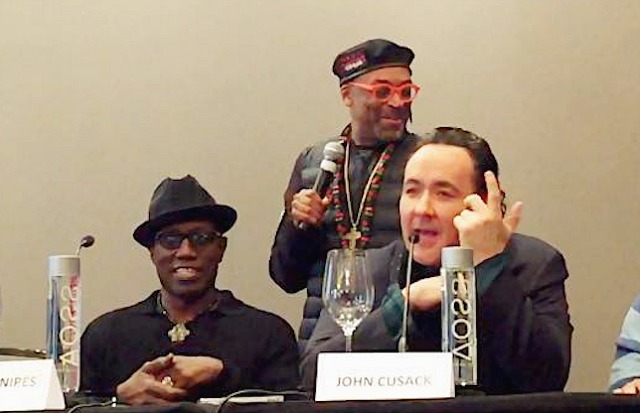Spike Lee: Chi-Raq Is Not Meant To Solve Chicago's Violence Problem
By Joel Wicklund in News on Nov 24, 2015 12:24AM

Scene from "Chi-Raq." (© 2015 | DA CHI PICTURES, LLC)
Confident as always, if seemingly annoyed by what he perceived as too many familiar questions, Spike Lee discussed his hot-button new movie Chi-Raq at a press conference held at noon Monday at the Waldorf Astoria Hotel.
Stars Teyonah Parris, John Cusack, Nick Cannon, Wesley Snipes, D.B. Sweeney and Harry Lennix also appeared at the event, along with the film’s co-writer Kevin Willmott and activist priest Father Michael Pfleger, the inspiration for Cusack’s character.
The press conference was brief and kept Parris, Snipes and Lennix mainly out of the mix. The few questions asked could not be addressed with fast and simple answers.
Chicagoist asked Lee whether he worried that audiences would react negatively to the film’s very broad sexual satire, which plays against tragic depictions of the deadly consequences of gun violence. He responded by referring to a movie classic: Dr. Strangelove.

Spike Lee stands above Wesley Snipes and John Cusack as the "Chi-Raq" press conference begins. (Photo: Lee Shoquist, courtesy of ChicagoFilm.com.)
“Stanley Kubrick is one of my favorite filmmakers and there are several homages [in Chi-Raq] to Dr. Strangelove,” Lee said, referring to the 1964 satire in which nuclear war breaks out. “And what is more serious than the destruction of God’s planet? But that film’s hilarious. So I really can’t understand this mindset that you can’t have different tones.”
But pressed, regardless of artistic intent, if he had worries about the public’s response, Lee answered simply, “No,” before passing the question on to Willmott.
The screenwriter offered up an example of the movie’s power to affect change, recounting the reaction from an unnamed acquaintance he brought to Sunday night’s invite-only premiere at the Chicago Theatre.
“[He’s] facing a court case right now which might send him to prison,” Willmott explained. “And he said to me afterwards, ‘I wish I had seen this two years ago.’”
Father Pfleger also endorsed the film, saying he was moved to tears by a scene in which Cannon’s rapper/gang leader character is confronted by grieving mothers.
“I told Nick this morning that the scene at the end with the mothers…it just left me angry that this reality is still going on in our city and our country.”
As for the sexual content, Pfleger was not offended. “I didn’t have a problem with that…I live in the real world. This is America and I wasn’t always a priest.”
Evanston native Cusack took exception to those who see Lee as a New York outsider making a film better suited for someone closer to the city and its problems.
“When I was making High Fidelity in Chicago, I had an English director named Stephen Frears,” Cusack noted. “No one said to me, ‘Why aren’t you using a Chicago filmmaker?’ ”
As Willmott’s original screenplay (before Lee’s involvement) was set in an unnamed urban area, Lee defended the decision to make it specific to Chicago, even though gun deaths plague other major cities.
“If we want to deal with this [gun violence], we have to deal with where it’s most prevalent. And I know people in Chicago are very sensitive about this, but the truth is the truth. And Chicago is the murder capital of the United States of America. Chicago is the mass murder capital of the United States of America. New York City is three times the population of Chicago, yet Chicago has more homicides than New York. That’s not me saying that…that’s the motherfuckin’ truth. So if you don’t like it, do something to change the numbers. And also, we did not make up the term ‘Chi-Raq.’ That was your fellow local rappers.”
Challenged by another reporter that Chi-Raq does not offer real world answers to the problem, Lee got a little touchy, jumping back in to make a vital point about unreal expectations placed on some art.
“I don’t want anyone coming to this film thinking Spike Lee says that if you do A, B, C, D, E, F, then the ills of all Chicago will be fixed.”
Cusack also weighed in on that matter.
“One of the things I hear from Father Pfleger, and I’m sure it’s repeated in mosques and synagogues and churches of all denominations all through the country, is that it’s local communities that are taking back their communities block by block. I don’t know if we can look to Washington and expect anything unless we mobilize in the streets.”
“There’s no sound bite answer to the problem,” Cusack said. “But I think you also have to say three letters that nobody wants to talk about because they’re a very popular lobby, but…N-R-A.”
Cannon spoke of working with local rappers and getting to know the city, as well as breaking away from his “good guy” image with his role in the film. But perhaps Lee’s most passionate defender was Sweeney, the veteran actor best known for his ‘80s and ‘90s roles in movies like Eight Men Out (with Cusack) and The Cutting Edge.
“I thought it was incredibly silly that we had politicians criticizing Spike Lee coming to town to make a movie when this guy is a one-man African-American jobs program," said Sweeney. “He got more jobs for young brothers and sisters on the South Side last year than any alderman I know about.”